Review: Star Trek Beyond
I watched a My Little Pony: Friendship is Magic documentary two years ago, about the Brony phenomenon. I'd seen one episode of the show and couldn't maintain interest, but I wanted to understand where the passionate love from adult men for the program came from. It wasn't a matter of judgment, but simply that the fandom seemed a genuine anomaly, fascinating in its own right in how it aggressively broke free of the strict gender demographic segregation of all ages media.
The documentary didn't clear much up, but it did leave one impression on me. Repeatedly, one of the primary defenses of the show from the fans themselves was My Little Pony's morals. Men in their late teens and early twenties talked about how meaningful and powerful the show was for communicating life lessons like "being honest with your friends is good" and "be yourself." If anything the documentary left me more confused, making me wonder what cultural famine left adults feeling spiritually fulfilled and morally educated by these grade school morality tales. Boys loving something pink isn't bewildering to me. Finding "don't judge a book by its cover" deep when you're drinking age, is. 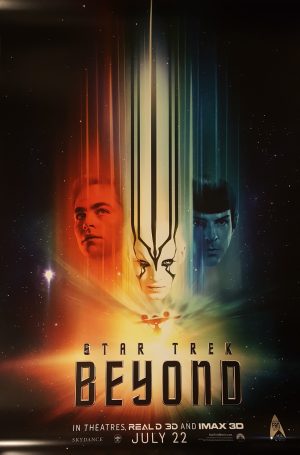 This brings us to another cultural phenomenon, one that inspired bewilderment in its own age and helped establish the modern face of fandom as we know it. I'll proudly admit that as a young man, Star Trek was an important part of my moral education. Yes, after I just insulted thousands of young men for gaining self-empowerment from a show about cartoon horses I just claimed I was made a more complete person by a show about people shooting lasers in front of cardboard backdrops. However, I will go to task for the philosophical sophistication of The Next Generation any day. From the obvious examples like "The Measure of a Man" which hinged the drama on answering the question whether or not an artificial intelligence can be considered alive, to the less referenced like "Silicon Avatar," where arguments are made to the defense of the right to life of an intelligent entity of incredible destructive power. Not every episode was so philosophically arch, or particularly subtle, but before we had Star Treks where crew members had to decontaminate by stripping to their underwear and rubbing each other with lube (or pick your episode of Voyager where Star Trek died) it was a franchise that built its reputation on its championing of humankind, the value of life, and the constant strive to improve ourselves as individuals and a collective species.
This brings us to another cultural phenomenon, one that inspired bewilderment in its own age and helped establish the modern face of fandom as we know it. I'll proudly admit that as a young man, Star Trek was an important part of my moral education. Yes, after I just insulted thousands of young men for gaining self-empowerment from a show about cartoon horses I just claimed I was made a more complete person by a show about people shooting lasers in front of cardboard backdrops. However, I will go to task for the philosophical sophistication of The Next Generation any day. From the obvious examples like "The Measure of a Man" which hinged the drama on answering the question whether or not an artificial intelligence can be considered alive, to the less referenced like "Silicon Avatar," where arguments are made to the defense of the right to life of an intelligent entity of incredible destructive power. Not every episode was so philosophically arch, or particularly subtle, but before we had Star Treks where crew members had to decontaminate by stripping to their underwear and rubbing each other with lube (or pick your episode of Voyager where Star Trek died) it was a franchise that built its reputation on its championing of humankind, the value of life, and the constant strive to improve ourselves as individuals and a collective species.
That Star Trek is gone now, but that's not news. This intro isn't to bemoan the tragedy (genuine that it is) that Star Trek has become Mission Impossible in space. Star Trek '09 was that, and I enjoyed the movie immensely, despite its howling plot holes and crass bastardization of a once meaningful franchise. Because it was fun. Because it had personality and a sense of humor. It was still a hollow shell, but Star Trek as a property had been dead for years, seeing it strung up with 'splosions and women in their underwear wasn't as offensive as it might have been at one time. Until Into Darkness came along. Ugly, mean-spirited, and shitting on Roddenberry's spacebound ashes, Into Darkness was one of the worst experiences I've had in a theater this last decade. I actually started writing on this site because of a positive review someone wrote here that inspired me to throw my own misanthropic hat into the critical slurry. Like Man of Steel (and even more fittingly, Batman Vs. Superman), the outrage wasn't entirely ignored, and this year's Star Trek Beyond was championed by the producers, screenwriters, and cast as a return to form for Star Trek. It's about exploration. It's about teamwork. It's about adventure. Simon Pegg was screenwriting. We're sorry. We're so begrudgingly sorry for Into Darkness. Please forgive us with your money.
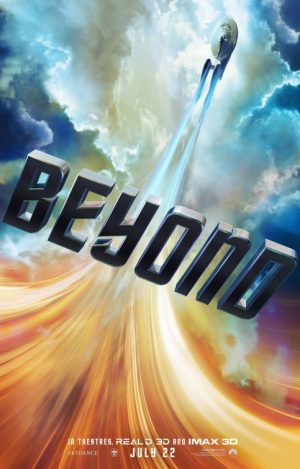 This was the intro to the review. It's longer than some entire reviews I've written. It's this long because I need you to understand. I need you to understand how a man who claims The Phantom Menace was deeply upsetting to him, helped kill Star Trek even deader than it already was. It's because of promises like saying your bringing Star Trek back to its roots. Nobody should have believed it, and I certainly didn't. It's directed by someone whose major claim to fame is making the Fast and the Furious films popular again; it's not going to be real Star Trek. That's not the problem. The problem is having a seemingly smart talented screenwriter say that, and then deliver us My Little Pony.
This was the intro to the review. It's longer than some entire reviews I've written. It's this long because I need you to understand. I need you to understand how a man who claims The Phantom Menace was deeply upsetting to him, helped kill Star Trek even deader than it already was. It's because of promises like saying your bringing Star Trek back to its roots. Nobody should have believed it, and I certainly didn't. It's directed by someone whose major claim to fame is making the Fast and the Furious films popular again; it's not going to be real Star Trek. That's not the problem. The problem is having a seemingly smart talented screenwriter say that, and then deliver us My Little Pony.
This is a more hopeful Star Trek. Gone is the post 9-11 grey Rainbow Six: Galaxy vibe. The score by the exceptionally talented Micheal Giacchino (as forgettable as it is this time around) is more upbeat and makes more intentional nods to the original series. The movie doesn't end with the Enterprise crew wearing pseudo-Nazi uniforms this time. However, the moral sophistication they try to introduce is laughably childish. While Into Darkness even briefly toyed with debating the morality of executing criminals without trial, the beating moral heart of Star Trek Beyond is "war bad, peace gud." The cast awkwardly and horribly crams bland meaningless maxims about togetherness and unity between the endless babbling technoexposition, making them sound more like a lame cult than morally informed citizens of humanity. The villain retorts in his asthmatic rumble with contrary statements that have all of the intellectual challenge and subtly of a Care Bears villain. Star Trek Beyond isn't worse than Star Trek Into Darkness. The one saving grace of the film is Darkness made a goal out of spraying cookie shits all over one of the best entries in cinematic Star Trek, while this one tells its own story, meaning they only get to ruin their own work. What Beyond is, however, is more pathetic. I was ready to give this film a chance. I even liked a lot of what it started with. What I got was another confirmation that trailers do in fact tell you everything you need to know about blockbusters today. Trust your instincts, nobody is even trying anymore.
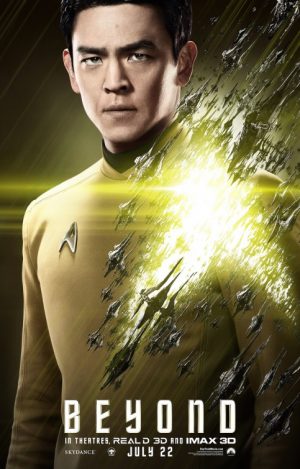 All of the good things about the movie fit in the first 30 minutes. Immediately, Star Trek Beyond does some smart things. It jumps right into the characters without obnoxious ostentatious buildup. The characters don't get their own dramatic introduction, there isn't a big reveal of the Enterprise. Instead, Beyond throws you into the story like you'd never left it. I imagine the thinking was to recreate the feeling of coming back to the next episode of a television show, just another chapter without the unnecessary wonderment at seeing these characters together again. It's a welcome choice that felt smarter than the dumb "Raiders of Twizzler Planet" opening Darkness stared with. The characters are introspective but not so far as to be broody. Leonard Nimoy's death is referenced in a way that could have been very interesting, as in-universe Old Spock dies as well, making Young Spock reflect on the meaning of the time he has left. It's a great idea. That's what I'm doing here. Listing the few great ideas.
All of the good things about the movie fit in the first 30 minutes. Immediately, Star Trek Beyond does some smart things. It jumps right into the characters without obnoxious ostentatious buildup. The characters don't get their own dramatic introduction, there isn't a big reveal of the Enterprise. Instead, Beyond throws you into the story like you'd never left it. I imagine the thinking was to recreate the feeling of coming back to the next episode of a television show, just another chapter without the unnecessary wonderment at seeing these characters together again. It's a welcome choice that felt smarter than the dumb "Raiders of Twizzler Planet" opening Darkness stared with. The characters are introspective but not so far as to be broody. Leonard Nimoy's death is referenced in a way that could have been very interesting, as in-universe Old Spock dies as well, making Young Spock reflect on the meaning of the time he has left. It's a great idea. That's what I'm doing here. Listing the few great ideas.
My favorite idea, that could have resulted in a great adventure movie, is the splitting up of the crew. After the big plot centric disaster, the crew is divided into pairs, allowing for much more screen-time and a split focus, giving everyone moments and things to do (except Uhura, who once again is relegated to looking distraught at things). Breaking up the bromance of Kirk and Spock, the oft ignored Leonard McCoy gets to hang out with the green blooded bastard, playing the Odd Couple in space the original show cast them as. Scotty gets to hang out with a new playmate, a "badass" lady alien wearing makeup seemingly plagiarized from the Morlocks in that terrible Guy Pearce version of The Time Machine. Kirk and Chekov team up to essentially... eh, it doesn't result in much. It's a pity The Green Room couldn't have premiered after this so it could have definitively been Anton Yelchin's farewell picture, as he's easily the most wasted member of the cast this time around. Star Trek Beyond does what the X-Men franchise always needed to do, have the balls to tell stories with characters that aren't the go-to leads. Seeing Spock and McCoy have their own mini adventure was nice, and when the crew reforms they still all have their own dynamics with each other (except Sulu, because he was paired with Uhura, which again, was only there to look really, really upset at stuff). Great. Great. This is good screenwriting and I am happy to see it in play. Except it's got no charisma. I laughed twice during this movie, and smiled once, and this film is front loaded with jokes. Problem is, the jokes are all stale fill in the blank adventure comedy humor. For coming from the co-writer of probably the perfect comedy film since the turn of the millennium, Hot Fuzz, Simon Pegg's script is loaded with the most obvious rote one-liners you can think of, practically a checklist of comedy clichés. I'd love to blame Justin Lin, who clearly doesn't have a great handle on managing performances in the movie, lacking a certain energy that J.J. Abrams milked out of the talented ensemble, but these actors and this director had almost nothing to work with.
Keep in mind, we just finished covering the parts of the film I actually enjoyed. Now lets take the turn.
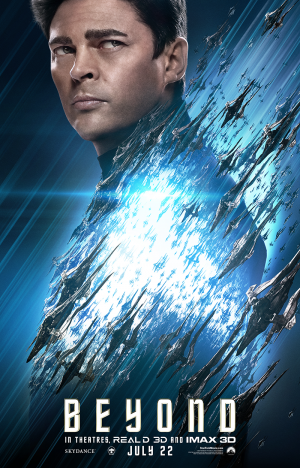 I'm going to be an asshole and start the synopsis here, but that's only because proper context is required when discussing the utter desolation that is the climax of this film. While on their three-year mission into deep space, Kirk and crew stop by a futuristic new Starbase that proves that people still aren't done being amazed by the folding city visual from Inception. They intercept a survivor from a space disaster, apparently a ship marooned on a planet hidden in an impenetrable nebula, nebula in this film being a word that describes an asteroid field, because Beyond had to find some way to top the "cold fusion being cold" gaffe that Into Darkness gave us. The Enterprise being the only ship capable of penetrating the rocky mess, they find a trap waiting for them, a swarm of tiny ships that tear the Enterprise to shreds. The leader of this force is our villain, Durian Luther, who tries really hard to be memorable, intimidating, and ruthless, but instead gets a chair next to General Grievous and Balem Abrasax as high kings of worthless sci-fi villainy. The Enterprise destroyed, the crew has to band together to keep Durian Luther from using an extremely hackneyed and shockingly meaningless MacGuffin from destroying the universe... maybe.
I'm going to be an asshole and start the synopsis here, but that's only because proper context is required when discussing the utter desolation that is the climax of this film. While on their three-year mission into deep space, Kirk and crew stop by a futuristic new Starbase that proves that people still aren't done being amazed by the folding city visual from Inception. They intercept a survivor from a space disaster, apparently a ship marooned on a planet hidden in an impenetrable nebula, nebula in this film being a word that describes an asteroid field, because Beyond had to find some way to top the "cold fusion being cold" gaffe that Into Darkness gave us. The Enterprise being the only ship capable of penetrating the rocky mess, they find a trap waiting for them, a swarm of tiny ships that tear the Enterprise to shreds. The leader of this force is our villain, Durian Luther, who tries really hard to be memorable, intimidating, and ruthless, but instead gets a chair next to General Grievous and Balem Abrasax as high kings of worthless sci-fi villainy. The Enterprise destroyed, the crew has to band together to keep Durian Luther from using an extremely hackneyed and shockingly meaningless MacGuffin from destroying the universe... maybe.
It's something that doesn't strike you till the end, that every tiny detail in the movie is set up for an annoying payoff later, and the really big things you expect to be elaborated in more detail are left vague for some reason. There's a lot of little touches in the movie, moments that feel like world-building, but eventually every single one of those will come back to irritatingly result in a twist or action moment. Scotty's little mascot friend's acid spitting head-cold joke? The crew will use it to break out of prison. That video playing in the abandoned Starfleet craft? Will result in some inspiringly ill-conceived Keyzer Soyzeying of the main villain. Even fucking Morlock Babe's affinity for anachronistic 90's hip hop? Will result in the most stunning and horrifying moment of schlock in Star Trek history since a 57-year-old Nichelle Nichols did a sexy belly dance to distract some horny alien guards in The Final Frontier. I honestly couldn't believe what I was seeing. There are no words. Meanwhile, huge ideas are left completely unexplained. A character's physical transformation, key to the plot, is left without explanation. The MacGuffin, which has a long convoluted history of ownership, is never given a rational explanation for the transition of ownership, or character's arbitrary knowledge of it. The little stuff is given too much importance, and the big stuff is completely ignored.
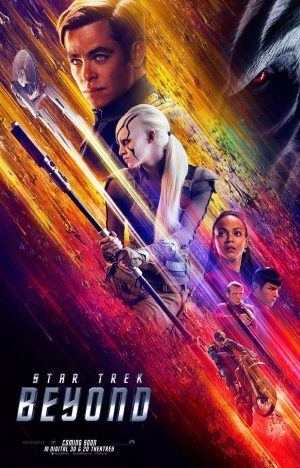 Finally, all the way at the bottom, the action sucks. Justin Lin, the guy who helped make the Fast and the Furious franchise not only successful again but financially capable of competing with Marvel superheroes, doesn't direct a single competent action sequence in all of this movie. Scenes are either hideously close up with Paul Greengrass shaky-cam, shrouded in inky darkness, or both. Like the Fast and the Furious, a couple dozen entirely fatal things happen to our leads with no physical repercussions, making them insultingly impervious to injury and tension. Most criminally, however, the action has no architecture. Even when fully lit, the action sequences are a messy blur of poorly directed and edited chaos, with characters blipping in and out of locations without any relationship to environments or each other. Contrast this to The Nice Guys, which came out earlier this year, a film that put a strong stamp on how modern action should be directed. The movie featured head-spinningly complex and multilayered action scenes, but through precise staging, attention to architecture, and clearly communicated character motivations, you could follow every beat perfectly. It's a relic from another era of action film-making, this thing called competence.
Finally, all the way at the bottom, the action sucks. Justin Lin, the guy who helped make the Fast and the Furious franchise not only successful again but financially capable of competing with Marvel superheroes, doesn't direct a single competent action sequence in all of this movie. Scenes are either hideously close up with Paul Greengrass shaky-cam, shrouded in inky darkness, or both. Like the Fast and the Furious, a couple dozen entirely fatal things happen to our leads with no physical repercussions, making them insultingly impervious to injury and tension. Most criminally, however, the action has no architecture. Even when fully lit, the action sequences are a messy blur of poorly directed and edited chaos, with characters blipping in and out of locations without any relationship to environments or each other. Contrast this to The Nice Guys, which came out earlier this year, a film that put a strong stamp on how modern action should be directed. The movie featured head-spinningly complex and multilayered action scenes, but through precise staging, attention to architecture, and clearly communicated character motivations, you could follow every beat perfectly. It's a relic from another era of action film-making, this thing called competence.
The film ends (no spoilers) with a toast to "absent friends." It's a callback, of course. Originally, it was made by Kirk, marking the passing of Spock in Star Trek III: The Search for Spock. It was a nice somber moment, given weight by the beloved status of the departed character. It was reprised by the character of Jean-Luc Picard, mourning the death of Data in Star Trek: Nemesis, itself a reference, made somewhat awkward by Data's uninspired demise being compared to Spock's iconic death in Wrath of Khan. Finally, here in Beyond, it is broadly used to commemorate the deaths of hundreds of nameless background crew members of the Enterprise, only one of which had a name and plot function, and who ultimately serve as little but tributes to action scene carnage. Even compared to Nemesis, considered to be one of the worst Star Trek films, this has little dramatic weight. For all of its preaching and lecturing of the value of teamwork and crews being a family, ultimately the only characters we're told to care about dying are the ones who get their name on the poster. Sulu's new husband isn't just in the film as a marker of the changing face of diversity, but so we can stick a face in the crowd of fleeing citizens of Starfleet that we can pretend we care about. Ultimately, that's what always gave Star Trek its heart, the love of life. Exploration in Star Trek itself was always centered around life. You didn't see many episodes about geological surveys or measuring nebula (the non-asteroid kind), it was about other civilizations, the multifaceted, complicated, strangeness of life in all its expressions. In Beyond, life is a plot device, to be preserved only for its utility of dramatic tension. For all those promises of a new era of Star Trek, it's all the more disappointing to see a supposed attempt result in so little. The franchise as a franchise will continue on to a fourth entry, audiences apparently will respond well to x-treme dirtbike stunts in Star Trek films, but the soul is, and will likely remain, as dead as Morn.
[su_box title="Score: 1/5" style="glass" box_color="#8955ab" radius="6"]
[/su_box]